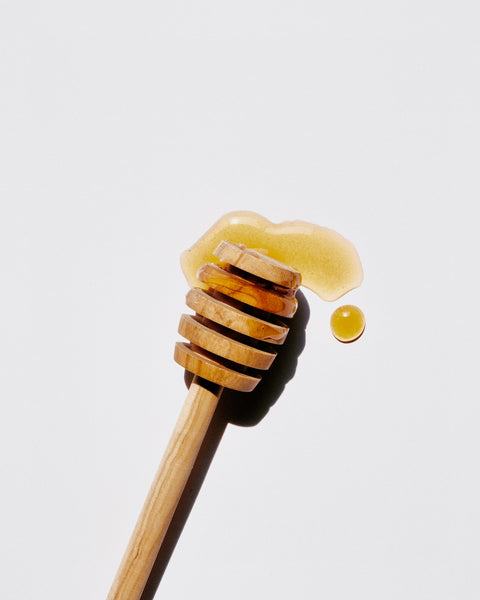What’s the difference between natural sugar vs. sugar alcohols in protein bars? 🤔
We’ve all been there — cruising the protein bar aisle, scanning labels like detectives hoping to crack a case. You want a minimally processed, whole-food protein bar that keeps you fueled, satisfies your sweet tooth, and curbs afternoon cravings. But those labels can get confusing fast.
“Sugar alcohols” sound scientific. “Added sugars” scream villainous. And natural sweeteners like honey and coconut nectar get lumped in with enemy #1: refined sugar.
So, which option is healthiest? Let’s explore the science of sweetness to learn about these types of sugar and how they affect your body.
Natural Sugar vs. Sugar Alcohols: Sweetness with a Side of Science
Let’s start with the basics:
🍯🥥 Natural Sugars: Nature’s Simple Sweeteners
Natural sugars are simple sugars found naturally in whole foods, such as honey, coconut nectar, and maple syrup.
These natural, better-for-you sugars are not the same as the highly refined white sugar you want to avoid on a clean eating game plan. They’re minimally processed and contain beneficial nutrients like vitamins, minerals, and antioxidants.
🧪 Sugar Alcohols: Bit of a Science Experiment
Erythritol, sorbitol, xylitol, mannitol, and maltitol are some of the most common protein bar sweeteners.
Chemically, they have characteristics of both sugars and alcohols — but they don’t contain the type of alcohol that will get you tipsy.[*]
Though sugar alcohols naturally occur in some fruits and plants, their quantities are too low for food manufacturers to actually use. So most sugar alcohols are highly processed and commercially produced from sugars and starch instead.[*]
Here’s the key difference: Our bodies don’t fully absorb sugar alcohols like regular sugar. This means they have fewer calories (usually around half) and a smaller impact on blood sugar levels. Sounds great, right?
Hold on, there’s more to the story!
The Trouble with Sugar Alcohols in Protein Bars: Not as Sweet as They Seem
Sugar alcohols might seem like a slam dunk for healthy protein bars, but here’s the catch:
😐 Sugar Alcohols May Cause the Belly Blues
Can sugar alcohols cause stomach upset? You bet!
Because our bodies don’t fully absorb them, sugar alcohols can ferment in your gut, leading to bloating, gas, diarrhea, abdominal pain, and other unpleasant side effects — especially for those with digestive disorders (IBS, IBD, etc.) or sensitive GI systems.[*][*][*][*]
Imagine fueling your workout with a protein bar, only to have your stomach feeling like a balloon. Not exactly ideal. If you’ve ever experienced that post-protein bar rumble, a sugar alcohol might be the culprit.
💡 Related: The Relationship Between Plant-Based Protein and Better Gut Health
🫣 Sugar Alcohols May Skyrocket Sugar Cravings + Weight Gain
Studies suggest that sugar alcohols trigger cravings for even sweeter foods. It’s like a sneaky bait-and-switch — your body thinks it’s getting sweetness, but it doesn’t get the full satisfaction, leaving you wanting more.
One study even showed that consuming high levels of erythritol was associated with weight gain — specifically, increased belly fat.[*]
These downsides are totally counterproductive if you’re trying to manage your sugar intake, ditch a refined sugar habit, shed a few LBs, or stick to your clean eating goals.
😝 Sugar Alcohols May Leave an Unpleasant Aftertaste
Let’s be honest; some sugar alcohols don’t taste good — and that lingering aftertaste can make even the healthiest protein bar unappetizing.
Those chalky, metallic, tingly, minty, or just plain “off” flavors can easily overpower the taste of healthy protein bar ingredients like almonds, cashews, vanilla, and cinnamon. Yuck!
😬 Erythritol May Not Be Your Heart’s BFF
Researchers from a recent study linked erythritol consumption to an increased risk of “major adverse cardiovascular events,” including heart attacks and strokes.[*]
Clean eating plans aim to protect your ticker, not put it in harm’s way. So this is a major issue to consider.
Knowing all those drawbacks, let’s talk about the benefits of natural sugars in protein bars.
Natural Sugars: Why Honey + Coconut Nectar Reign Supreme
The FDA classifies all added sweeteners, including natural ones, as “added sugar” on food labels. But this doesn’t necessarily mean they’re bad for you.
While natural sugars may add some calories to your protein bar, they deliver benefits that sugar alcohols can’t compete with. Natural sweeteners in protein bars:
😋 Offer Flavor For Days
Honey and coconut nectar add a depth of flavor that sugar alcohols just can’t compete with. They enhance the overall taste experience of your bar, making it a satisfying and enjoyable treat.
When you eat delicious foods in moderation and practice mindful eating, you’ll never feel deprived. You’ll likely find it easier to avoid food temptations or overeat. And all these perks make following a clean diet much more sustainable.
💪 Are Whole-Food Powerhouses
Honey and coconut nectar are minimally processed natural sweeteners, keeping their good-for-you nutrients intact.
Our ancestors have been noshing these sweeteners for generations, and researchers have been studying their potential health benefits for decades. Check out the science behind:
When it comes to ingredients in the simplest protein bars ever, real, whole foods are always the way to go — especially when they pack such well-studied health benefits.
⚡ May Be the Key To Steady Energy Levels
Natural sugars are single or double molecules of sugar that our bodies can easily absorb and use for energy. This immediate energy source can help you power through a workout, recover post-exercise, or bust through an afternoon slump.
Plus, natural sugars provide a sustained form of energy, unlike the quick spikes and crashes you get with refined sugar. You’ll be able to maintain your mental performance and physical endurance without tapping out (or getting cranky).
These are just a few outstanding benefits of eating whole-food protein bars with natural sweeteners. So:
Don’t Let the Rise Bar Label Scare You — Embrace Natural Sweeteners!

Here’s the deal with our protein bars: we sweeten our whey protein bars with honey and our plant protein bars with coconut nectar.
Why? Because we believe in using whole, unprocessed ingredients that nourish your body and keep you feeling your best!
Sure, our bars might have a few more grams of “added sugar” than some sugar alcohol-laden options. But your body deserves the good stuff — no fillers, fakes, artificial sweeteners, or sugar alcohol side effects.
So, fuel your body with real food, not chemical concoctions. Grab a Whey 4-Bar Sample Pack or Vegan 4-Bar Variety Pack to experience the difference real, clean protein bars make! 🙌
Author: Devan Ciccarelli
Email: devan@behappynothangry.com
Instagram/Facebook Group: @behappynothangry/Be Happy Not Hangry
Website: www.behappynothangry.com




